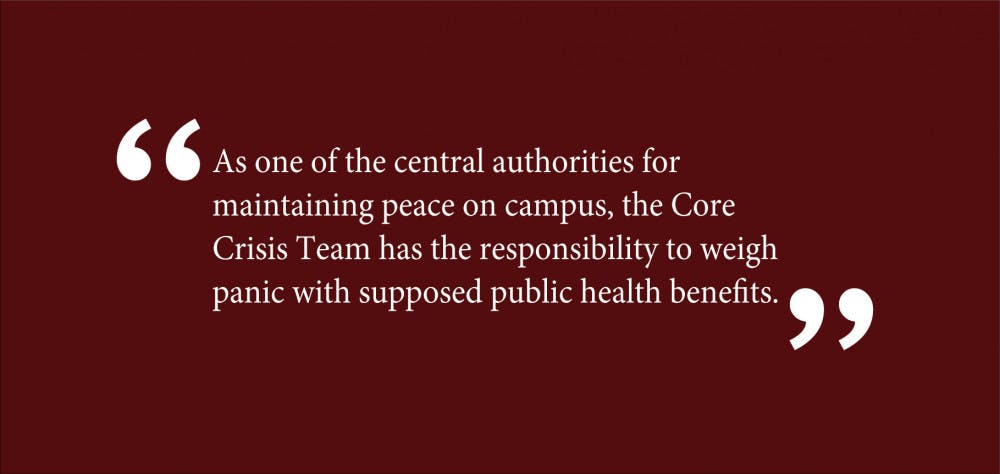On Friday, President Christina Paxson P’19 announced that the University will cancel all non-academic events with over 100 people, among other precautions. These events include a University-wide dance and a chance for admitted students to visit Brown’s campus. The University also postponed a lecture from former President Bill Clinton until next fall.
Am I missing something? Did Brown announce a case of COVID-19 on campus? Is the Rhode Island Department of Health not responding immediately and seriously? Does Rhode Island have more than three confirmed COVID-19 cases (by the time this piece went to press)? Do we have a tangible reason to panic? And if this is a crisis that warrants canceling these events, shouldn’t large classes be canceled and dining hall capacity be limited?
If I am missing something, please write a response to this column. If I’m not, then Brown’s Core Crisis Team is overreacting. Yes, COVID-19 is dangerous. Yes, it is spreading quickly and easily, and yes, the mortality rate is alarmingly high. But there are no reported cases at Brown yet. Cancelling large events prevents the spread of a virus … that doesn’t seem to exist here. There is no visible risk of infection yet between students, faculty and staff because no one has it, that we know of. And though it’s true that — however unlikely it may be — some Brown community members could have asymptomatic cases of COVID-19 and could therefore pass the virus on to others, transmission could just as likely occur in classrooms or other community spaces. So while these cancellations may delay possible transmission, without canceling classes, they will not prevent the inevitable; instead, they only add to the mass hysteria surrounding the virus and undermine University life.
Some students will not get to learn from one of the most powerful world leaders of our time. Admitted applicants will miss the opportunity to see first-hand all that Brown has to offer. And given that University administrators have cited ADOCH as a critical factor for improving yield, it is possible that the change may negatively impact the University as well. How many other opportunities will we lose?
The cancellations also spread panic among the University community. Group chats and Facebook groups have blown up over the past week as students increasingly fear the spread of the virus, and the cancellations only add to the perception that the virus has spread further in the local community than has been reported. As one of the central authorities for maintaining peace on campus, the Core Crisis Team has the responsibility to weigh this panic against supposed public health benefits.
Furthermore, if there were a real threat of transmission to Brown’s community, the steps taken by the Crisis Team would not be sufficient. Students would almost certainly still be at a high risk of infection through classroom transmission, and canceling just non-academic events would be ineffective. Even if classes were canceled in addition to non-academic events, there would STILL be a high risk of infection — dining halls used by the majority of undergraduates make university campuses potential hotspots for widespread, rapid viral transmission. Though the University has begun implementing stricter measures in the dining halls, such as limiting students’ ability to serve themselves and putting glass up at the dessert serving station in the Ratty, the mere fact that hundreds of students are eating in the same vicinity creates a higher risk for transmission that is nearly impossible to mitigate. Scarily enough, one of the only ways to effectively combat transmission on campus might be to completely shut down the University and move classes online for the remainder of the semester. Some schools with active, serious threats of COVID-19 have reacted accordingly — the University of Washington, Seattle University and Stanford University have canceled in-person classes while affected municipalities coordinate their responses to the virus, moving lectures and finals online.
While the event cancellations are an overblown reaction, I commend the University for restricting travel to CDC Level 3 destinations, as well as for regularly updating the community on the latest guidance. I’m not oblivious to the very significant impact that the virus can have, and Brown should continue evaluating further restrictions as the situation develops.
If, and when, COVID-19 comes to campus, President Paxson can and should oversee a swift and strong reaction against it. Announcements like this one should be the bare minimum at that time, and the University will likely take significantly more drastic measures, just like other schools with cases have begun to do. Until that time, the President and the Core Crisis Team should avoid inciting a panic on campus and undermining key aspects of University life.
Jonathan Douglas ’20 can be reached at jonathan_douglas@brown.edu. Please send responses to this opinion to letters@browndailyherald.com and op-eds to opinions@browndailyherald.com.





